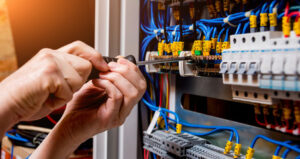Industrial Electrician installs, repairs and maintains electrical systems in industrial settings. They are also able to read and interpret blueprints and technical drawings.

An industrial electrician can work in factories, mines, chemical plants, construction sites, shipyards and oil and gas refineries. They are often hired on temporary contracts with the goal of landing a permanent job.
When it comes to industrial electrical services, securing the expertise of licensed professionals is critical. Industrial electricians offer a broad range of installation services, from rewiring 3-phase service installations to installing refrigeration power. They also provide maintenance services to keep your facilities running smoothly and prevent unexpected downtimes, which can lead to lost revenue.
In addition to ensuring that all electrical work is completed in compliance with industry codes, standards, and regulations, industrial electricians must be flexible enough to adapt to varying work practices. They must also be able to read and interpret blueprints and technical drawings.
The job description of an industrial electrician differs slightly from a commercial electrician, but both are responsible for the installation and repair of electrical systems and equipment. The main difference is that an industrial electrician may be required to deal with high voltage equipment, which requires additional training and certification.
An industrial electrician may also need to be comfortable working at heights and navigating hazardous areas. They need to have physical stamina, as well as dexterity and attention to detail. They must also be able to work on a variety of electrical equipment, including generators, circuit breakers, sensors, and transformers.
A skilled industrial electrician is a vital part of any company. This is because industrial companies rely on their machinery to produce goods, and any malfunction can significantly impact production. An industrial electrician can identify and fix issues with their machinery to minimize downtime and ensure that all products are delivered on time.
Additionally, industrial electricians can install contingency systems such as backup generators to protect against power outages. This will allow businesses to continue operating even when the grid is down. If you’re looking for an industrial electrician, then contact the experts at Elmhurst Electric today to discuss your needs.
Maintenance
Industrial electricians have a wide variety of maintenance services to offer. They install and repair electrical machinery, and data and communication systems (much like commercial electricians) at large industrial facilities, including chemical plants, construction sites, warehouses, and factories. They are also trained to manage, maintain, and repair complicated hydraulic systems, pneumatic systems, industrial motors, robotics, and boilers.
Just like residential and commercial electricians, industrial electricians are required to have a valid trade certification and on-the-job experience. However, unlike residential electricians, industrial electricians have additional training and are able to work with higher-voltage electrical components. This is due to the fact that industrial settings use three-phase power rather than single-phase, which operates at a much higher voltage level.
Additionally, industrial electricians are able to perform more complex tasks, such as reading and interpreting technical drawings and wiring diagrams. In addition, they have the knowledge and skills to troubleshoot issues in industrial settings, where the smallest electrical issue can result in fire or injury.
Many industrial electricians are shift workers who are directly employed by a particular facility, or a group of facilities within a particular area. Others work for contracting companies and may be dispatched to multiple locations during the same shift.
During a maintenance visit, an industrial electrician will inspect and test electrical wiring, equipment and systems to ensure that they are working properly. They will also make any necessary repairs to keep the equipment running at peak efficiency and performance.
Electrical repair and maintenance are crucial for keeping your business running smoothly. Having experienced and professional industrial electricians on hand to deal with any faults or interruptions will help to reduce downtime and avoid any costly production delays.
Repair
Unlike residential and commercial electricians, industrial electricians focus on the installation and maintenance of electrical components in large industrial settings. This includes plants, factories, foundries, and other large industrial buildings. These systems are more complex than those in homes and offices, and they use high-voltage equipment like transformers and generators. As such, they must follow strict protocols for safety.
An experienced Industrial Electrician can keep your company’s electrical systems functioning well and prevent them from malfunctioning or causing a fire. These professionals are also experts at troubleshooting and can identify potential problems before they become major issues. They can also perform routine tests to ensure that all equipment is functioning properly, and they can replace broken or faulty equipment as needed.
In addition to these core functions, Industrial Electricians can provide additional services like installing new wiring and running conduit. They can install equipment in accordance with blueprints and schematics, program and test machinery to make sure it works correctly, and make sure all electrical work is up to code. Having the right electrical system in place can help companies reduce energy usage, which is important for both environmental sustainability and their bottom line.
A skilled Industrial Electrician can also keep your company’s electrical systems safe from hackers. Hackers are always finding new ways to exploit businesses, and electrical systems can be an easy entry point. A professional Industrial Electrician can protect your company from these threats by performing frequent inspections and ensuring that all of your electrical components are up to date.
The demand for Industrial Electricians is growing, and it’s not hard to see why. These individuals are essential for maintaining the functionality of electrical systems in industrial settings. Their expertise in high-voltage systems and knowledge of the unique wiring requirements for manufacturing machinery set them apart from other types of electricians.
If you’re interested in becoming an Industrial Electrician, consider completing an apprenticeship program. This way, you can learn the skills necessary for this career while being paid to do so. Once you’ve earned your journeyman license, you can start working independently. In some cases, you may even be able to open your own electrical contracting business.
Troubleshooting
When a piece of equipment fails to function properly, it’s the job of an Industrial Electrician to identify and repair the problem. This involves a combination of methods and techniques that depend on the type of issue at hand. However, most troubleshooting procedures rely on several key elements. They include thorough observation, examining the circuit for signs of mechanical damage (like burns or strained wires), and substituting easily replaced components for those suspected to be faulty.
To perform a complete inspection of electrical wiring, an Industrial Electrician needs to have the right tools. This usually includes a multimeter, which can measure AC volts, DC volts, resistance, and small flows of current. It’s important to note that opening panels and measuring electricity requires special safety precautions, including insulated gloves and proper ventilation. This is because working with live wires or high voltage can be dangerous.
Once the problem is identified, an Industrial Electrician will start to trace and test the circuits that appear affected by the electrical fault. Often, this is enough to uncover the source of the problem. For example, if the problem stems from damaged or worn-out wires, it may be necessary to replace them and then retest the entire circuit.
It’s also possible that the problem stems from an electrical connection that is loose or corroded. In this case, it may be possible to fix the connection by resoldering the points and ensuring that they are clean and corrosion-free. However, it’s always best to consult with a supervisor or another professional before performing any repair work on electrical systems or equipment. They can provide guidance on the most effective troubleshooting techniques. This helps reduce downtime and avoid expensive repairs. It also helps ensure that employees and the public are safe from accidents caused by malfunctioning equipment.
